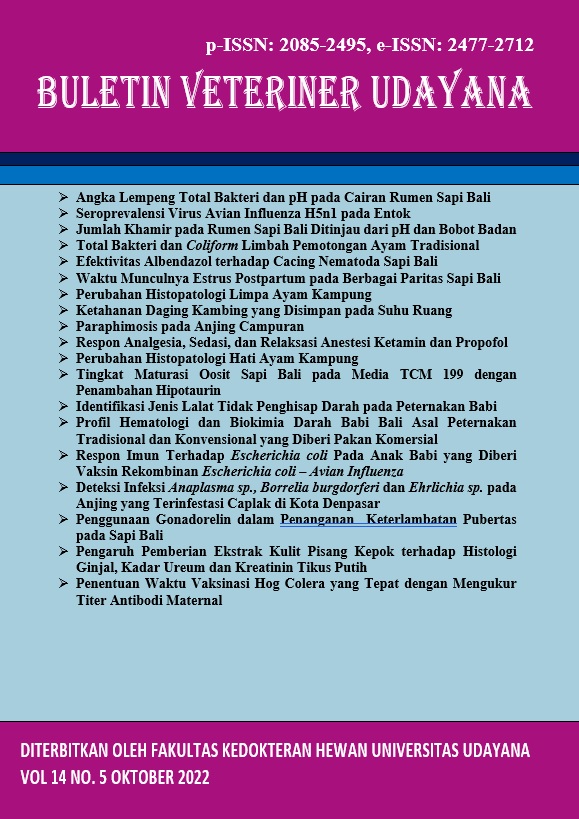SEROPREVALENCE OF AVIAN INFLUENZA VIRUS H5N1 IN MUSCOVY DUCKS IN PT. EPIKUR FARM-TABANAN, BALI
Abstract
Seroepideminological study of avian influenza virus of H5N1 (AIV-H5N1) in a muscovy duck flock has never been resported. This study was conducted to know the seroprevalence of AIV-H5N1 in a muscovy duck flock in PT EPIKUR Tabanan. Fourty-eght muscovy duck sera were colelcted, in which 23 were under 3 months old and 25 were more than one year old. Antibody to AIV-H5N1 was detected using haemaglutination inhibition (HI) test in deluted and undeluted sera. The delution was made by adding 4 time volume of PBS to 1 time volume of sera. The result shows that the seroprevalence of AIV-H5N1 in murcovy duck at PT. EPIKUR was 0% in young as well as old ducks.
Downloads
References
Chen HG, Deng ZLi‚ Tian G‚ Li Y‚ Join P‚ Zhang L‚ Liu Z‚ Webster RG, Yu K. 2004. The evolution of H5N1 influenza viruses in duck. PNAS. 101(28): 10452-10457.
Damanik EG, Kencana GAY, Mahardika IGNK. 2013. Bul. Vet. Udayana. 5(2): 139-146.
Ellis TM, Bousfield B, Bisset L, Dyrting K, Luk GSM, Tsim ST, Strum-Ramirez K, Webster RG, Guang Y, Peiris JS. 2004. Investigation of outbreaks of highly pathogenic H5N1 avian influenza in waterfowl and wild birds in Hong Kong in late 2002. Avian Pathol. 33: 492-505.
Fouchier RA‚ Munster V‚ Wollensten A‚ Besterbroer TM‚ Helfts S‚ Smith D‚ Rimmelzwaan CF‚ Olsen B‚ Osterhaus. 2005. Caracterization of a novel influenza a virus hemaglutinin sub type (h16) obtained from black headad gulls. J. Virol. 79: 2814-2822.
Hayden F dan Croisier A. 2005. Transmission of Avian Influenza Viruses to and between Humans. J. Infect. Dis. 192(8): 1318-1322.
Henaux V, Samuel MD. Avian influenza shedding patterns in waterfowl: implications for surveillance, environmental transmission, and disease spread. J. Wildlife Dis. 47(3): 566-578.
Hulse-Post DJ‚ Sturm-Ramires KM‚ Humberd J‚ Seiler P‚ Govorkova EA‚ Krause S‚ Scholtissek C‚ Puthavathana P‚ Buranathai‚ Nguyen TD‚ Peiris H‚ Webster RG. 2005. Role of domestic ducks in the propagation and biological evolution of highli pathonic H5N1 influenza viruses in Asia. PNAS. 102(30): 10682-10687.
Kemenkes. 2017. Kasus Flu Burung ke 200. https://www.kemkes.go.id/article/view/ 17110800005/kemenkes-umumkan-kasus-flu-burung-ke-200.html. Akses tanggal 9 Juli 2018.
Mahardika IGNK dan Tim Surveilans Pembebasan Penyakit AI Kajian AI FKH Unud. 2005. Laporan Surveilans Pembebasan Penyakit Afian Influenza di Propinsi Bali‚ Nusa tenggara Barat dan Nusa Tenggara Timur‚ Fakultas Kedokteran Hewan Universitas Udayana. Denpasar.
Monne I, Meseko C, Joannis T, Shittu, Ahmed M, Tassoni L, Fusaro A, Cattoli G. 2015. Highly Pathogenic Avian Influenza A(H5N1) Virus in Poultry, Nigeria, 2015. Emerg. Infect. Dis. 21(7): 1275-1277.
Olsen B, Munster VJ, Wallensten A, Waldenstrom J, Osterhaus AD, Fouchier RA. 2006. Global patterns of influenza A virus in wild birds. Sci. 312: 384–388.
Strum-Ramirez KM‚ Hulse-Post D‚ Govorkova EA‚ Humberd J‚ Sailer P‚ Puthavathana P‚ Buranathai C‚ Nguyen TD, Chaisingh A‚ Long HT‚ Naipospos TSP‚ Chen H‚ Ellis TM‚ Guan Y‚ Peiris JSM‚ Webster RG. 2005. Are ducks contributing to the endemicity of highly pathogenic H5N1 influenza virus in Asia?. J. Virol. 29(17): 11269-11279.
Suartha IN, Suartini GGA, Wirata IW, Dewi NMARK, Putra GNN, Kencana GAY, Mahardika IGN. 2018. Intranasal administration of inactivated AIV-H5N1 vaccine induced systemic immune response in chicken and mice. Vet. World. 11(2): 221-226.
Susanti R‚ Soejoedono RD‚ Mahardika IGN‚ Wibawan IWT‚ Suhartono MT. 2009. Isolasi dan Indentifikasi Virus Avian Influenza Subtipe H5N1 pada Unggas Air Sehat di Peternakan Skala Rumah Tangga di Jawa Barat. Media Kedokteran Hewan. 24(3): 139-146.
WHO‚ 2002. WHO Manual on Animal Influenza Diagnosis and Surveillance. https://apps.who.int/iris/handle/10665/68026. Akses tanggal 10 Juli 2018.
WHO. (2006). Avian – influenza¬ situation in Indonesia – update 14. www.who.int/csr/don/2006_05_23/en/index.html. Akses tanggal 12 Juni 2007.





